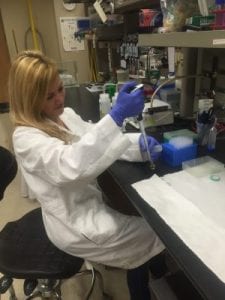Chemistry Student Researches Gene Expression

UCF Chemistry Department senior Monica Cortez recently returned to the sunshine state from 11 weeks in North Carolina. Cortez spent the summer working full-time in a biophysics laboratory perfecting a tool that can be used to control biological processes on a nuclear level.
Cortez was one of 12 students from across the United States that participated in the Biophysical Society’s competitive summer research program. Hosted by the University of North Carolina at Chapel Hill, the intensive program offers college students with 3.0 GPAs or higher a tuition-free opportunity to do lab work, attend lectures given by UNC faculty and participate in team-building activities and field trips, all while receiving a living stipend.
Cortez is a biochemistry major graduating in May of 2017. Her advisor, UCF Chemistry Assistant Professor Eda Koculi, Ph.D., sent her information about the summer program and suggested that she apply. Cortez gathered two letters of recommendation, wrote a personal statement and filled out an online application in order to be considered for admission. She doesn’t regret it.
“I’m very thankful I was able to work on my summer research project there,” Cortez said.
The project she worked on over the summer was the improvement of the dynamic range enhancement of the LANS photoswitch. The photoswitch is a tool used to control when genes are expressed. The project is still new and needs further research, but Cortez said that it could eventually be used in gene therapy.
Cortez has been performing research in Dr. Koculi’s laboratory in the physical sciences building on campus for the past year. She credits her lab time with helping her manage the long hours expected from any summer class.
“I felt that my classes and previous research at UCF largely contributed to my success in the program,” Cortez says. “There was a lot of research, and Dr. Koculi prepared me well because she requires a minimum of 20 hours a week of research from her students.”
Cortez’s main area of focus at UCF has been the DDX3 protein; a nuclear protein involved in breast cancer development and HIV infection. Further research into this protein may “inform the development of new classes of anticancer drugs,” according to Dr. Koculi’s laboratory website.
With graduation now being less than a year away, Cortez is looking toward finding her future in the vast field of chemistry.
“Biology and biochemistry are my strong suits,” she said. Her summer “vacation” to a collegiate laboratory confirms it.
